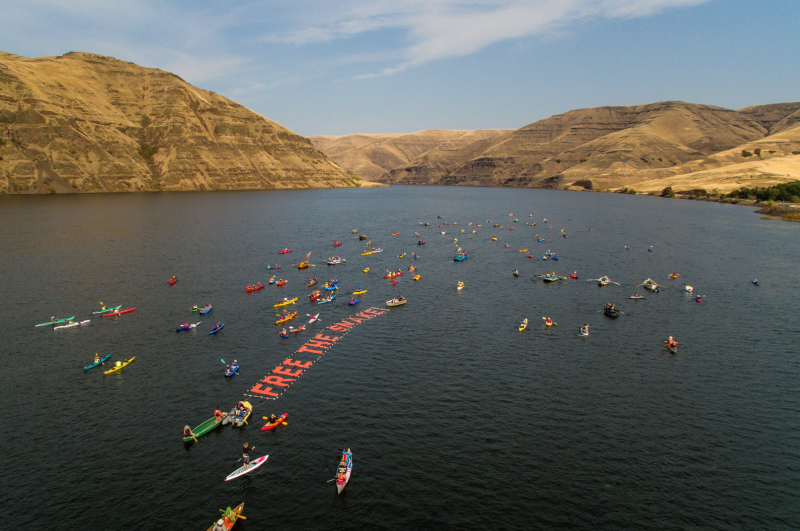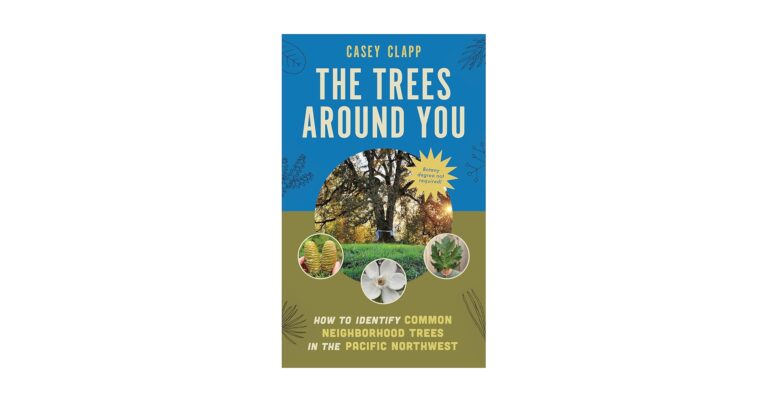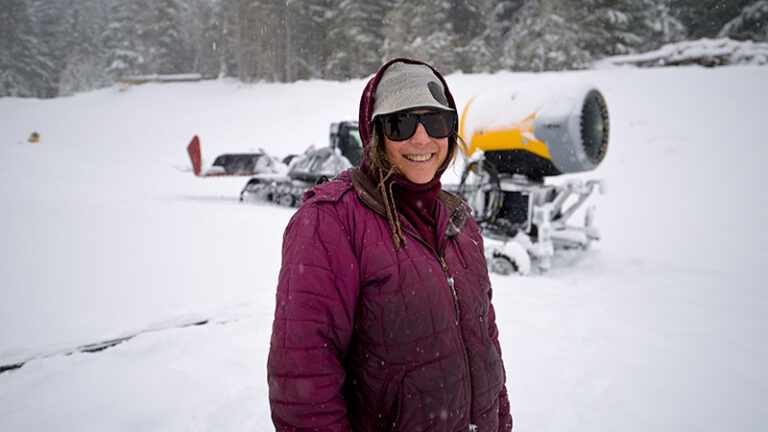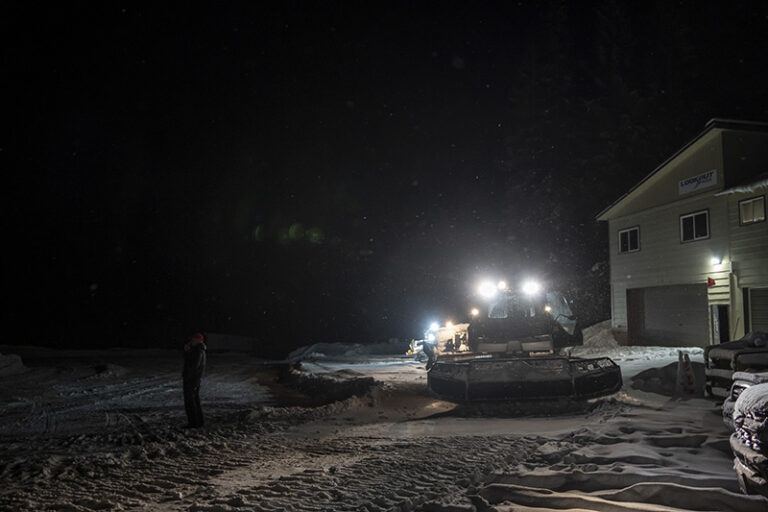By Derrick Knowles & Jon Jonckers
For our second annual public lands-themed issue, we wanted to highlight some of the hard-working non-profit organizations that make our public lands, and our lives, so much better. Rather than picking those groups and causes ourselves, we turned to some of Out There’s frequent advertisers who give back to our public lands through their support of these organizations.
In addition to making each issue of Out There possible, our advertisers are an incredible lot who not only do business in the Inland Northwest but also regularly give back to the places that make living here so special. I hope you find their stories and insights inspiring and discover a new public lands cause worthy of your support. (DK)
Spokane River Forum
What They Do: The Spokane River Forum’s mission is to create materials, events, and activities that promote regional dialogues for sustaining a healthy river system. A major project of the forum and partners has been the development of the Spokane River Water Trail, including improved access along the 111-mile length of the river. Spokanewatertrail.org
Local Supporter: Lyte Balance Electrolyte Concentrate
The Cause: The 40-mile stretch of the Spokane River from Post Falls Dam in Idaho to Nine Mile Dam in Washington is largely non-motorized with a variety of recreation uses. Since 2010 when the Spokane River Forum and others created the Spokane River Water Trail, 18 river access points have been restored.
Andy Dunau, founder of the Spokane River Forum, which brings diverse interests together to the benefit of the Spokane River, notes that river use since the trail was established has increased exponentially. “A lot of our attention now is on how do you maintain the river trail, keep the experience as safe as possible, and educate people,” he explains. “Keeping the river clean is a part of loving Spokane.”
Lyte Balance, a Liberty Lake-based company that makes an all-natural electrolyte concentrate that you can add to any beverage, was one of the first local companies to step up as a Water Trail Steward. Donors like Lyte Balance are critical to funding ongoing maintenance at water trail access points, says Dunau.
For Lyte Balance founder Tim Cunninghamm, the decision to help with funds to pay for the care-taking of two river trail access points was a natural fit. “We are a local company, and we love our river. We love the pleasure and the peace it gives us,” he says. Lyte Balance also provides their electrolytes to volunteer river cleanup crews, adds Cunninghamm. “It’s probably one of the greatest assets we have in Spokane—that a river runs through it and that we all get to be on it.” (DK)
Protect Our Winters
What They Do: Protect Our Winters (POW) helps passionate outdoor people protect the places and lifestyles they love from climate change. POW has grown from an idea into a worldwide network of more than 130,000 outdoor enthusiasts and supporters. Protectourwinters.org
Local Supporter: DOMA Coffee Roasting Company
The Cause: In 2007, pro snowboarder Jeremy Jones saw more resorts closing from the lack of snow that had always been reliable. Since he couldn’t find any organizations focused on getting skiers and snowboarders involved to help combat climate change, he formed Protect Our Winters, which quickly brought together other concerned pro athletes, outdoor enthusiasts, and elements of the outdoor industry. POW reminds us that we all need winter, and winter needs more of us who love the outdoors to get involved on its behalf.
Post Falls-based DOMA Coffee Roasting Company owners Rebecca and Terry Patano, both skiers and conservation-minded outdoor enthusiasts, heeded the call and began supporting POW after experiencing climate change impacts firsthand on a coffee sourcing trip to Peru.
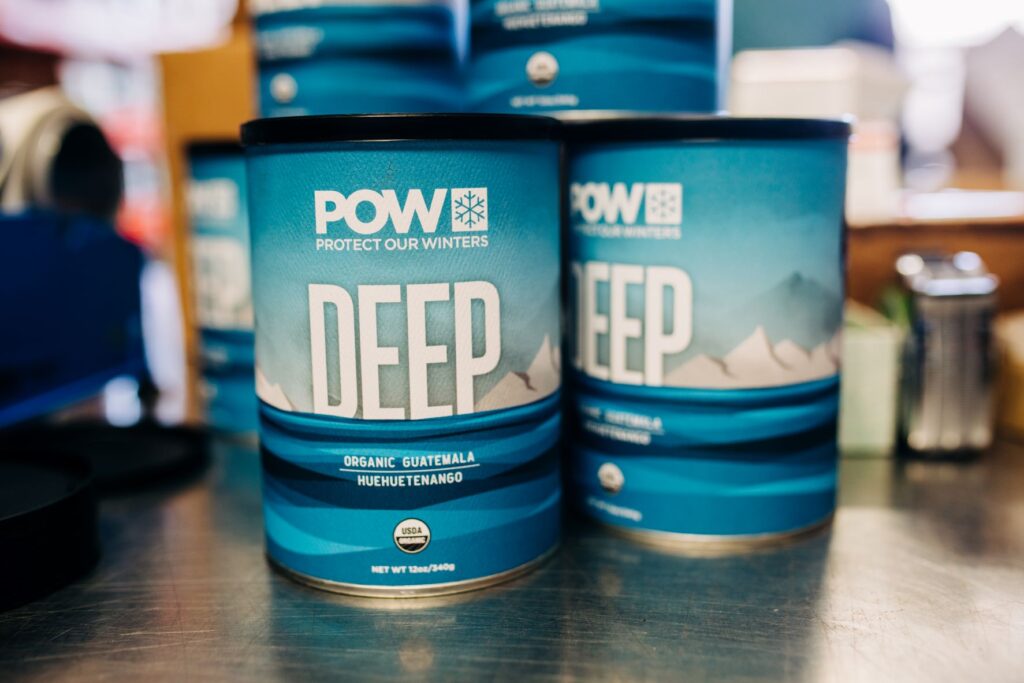
“We went into some places in the Andes and there was no snow, and no snow means no water and that whole cycle of things,” explains Terry. “And we said wow, what can we do back home that will have an impact? We knew a little about POW and looked into it a little more and liked the work that they were doing and said let’s get involved.”
That’s when DOMA created its DEEP coffee that supports POW with $1 from every can or bag sold, explains Rebecca. “If your views align with POW, we make it really easy. You just buy coffee and enjoy your morning, and we’ll donate your dollar.”
Rebecca says she has also witnessed the impacts of climate change in Central America, but it was the farmers in Guatemala, where the beans for their DEEP coffee come from, who first started voicing concerns about climate change. And that caught her attention.
“They were asking what are we going to do about water shortages, what are we going to do about the severe droughts we’re facing? They were the ones who motivated me,” she says. “We are seeing the impacts of climate change across the globe now and including in DOMA’s supply chain.”
It’s up to all of us to do whatever we can to reverse the impacts we’re having on the planet, adds Terry. “Whether you’re a hunter or fisherman or trail runner or skier, if you’re using the outdoors, it’s worth protecting. We all love the outdoors and need to do what we can to protect it so we don’t wake up one morning and it’s not there.” (DK)
Project Healing Waters
What They Do: Project Healing Waters Fly Fishing, Inc. (PHWFF), brings a high-quality, full-spectrum fly fishing program to an ever-expanding number of disabled active military service personnel across the Veterans Affairs Healthcare System, in military hospitals, and the Warrior Transition Command. Beginning in 2005 serving wounded military service members at Walter Reed Army Medical Center returning from combat in Iraq and Afghanistan, PHWFF has since expanded nationwide. Projecthealingwaters.org
Local Supporter: Dry Fly Distilling
The Cause: At their headquarters in the heart of Spokane, Dry Fly Distilling is committed to promoting public lands and conservation. Terry Nichols, VP of sales and marketing, reports that “Obviously streams, rivers and fish habitat are important to us.” Dry Fly invests in more than a dozen public lands advocacy groups, including Spokane Riverkeeper, Casting for a Cure, and Trout Unlimited. Dry Fly also supports Project Healing Waters.
Known for their genius method of using fly fishing as a therapy for vets, Project Healing Waters provides the physical and emotional tools for disabled military personnel and veterans to seek healing through fly fishing. PHWFF has become recognized as a leader and model of therapeutic outdoor recreation for the disabled, successfully using the sport of fly fishing as a rehabilitation tool.
The outings are much more than a one-day fishing trip. For many participants, the personal interactions, time out in nature, and camaraderie are as important and healing as the fishing itself. (JJ)
1% for The Planet
What They Do: 1% for the Planet is a global movement inspiring businesses and individuals to support environmental solutions to our planet’s most pressing environmental issues. Business partners pledge at least 1% of their yearly gross sales to approved nonprofit partners. Onepercentfortheplanet.org
Local Supporter: Townshend Cellar
The Cause: In 2002, Patagonia founder Yvon Chouinard helped create 1% for the Planet to encourage other businesses to donate to protect the environment. Townshend Cellar, located in Green Bluff, was one of the first Washington winery members of 1% for the Planet. Their local giving has been directed toward three Spokane-area non-profits and public lands causes: Evergreen East, The Lands Council, and Spokane Riverkeeper.
Townshend Cellar’s journey toward supporting local public lands and conservation causes began with enjoying the outdoors and eventually being in a business position where they could give back, explains Michael Townshend, who co-owns the business with his brother Brendon.
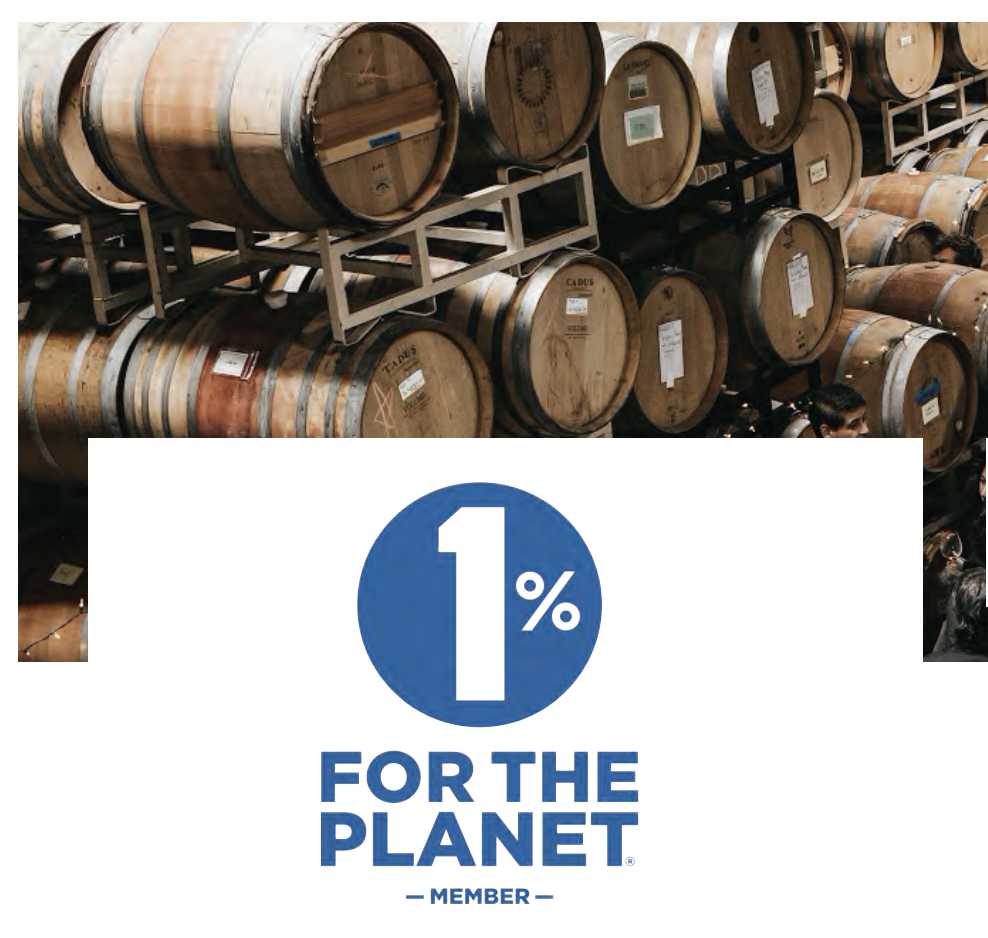
“We had been exploring ways to use our business to be a force of good for a while and in that process learned about 1% for the Planet. And that’s when we decided to committ to donating 2% of our total revenue to charitable causes that mesh with our values and ideals, and a major part of that is environmental causes,” says Michael.
Those efforts locally include supporting The Lands’ Council’s Spocanopy program that works to increase Spokane’s urban canopy by planting street trees for free in low-income neighborhoods, as well as lending a hand to Evergreen East Mountain Bike Alliance’s public lands trail building work.
“For Evergreen East we have a bunch of heavy equipment we use up at our farm in Green Bluff that we loan to them to use for trail building at Beacon Hill and Camp Sekani and up at Mount Spokane,” explains Michael. Townshend also donates wine to events and contributes financially to those two organizations plus Spokane Riverkeeper.
“Wine making is ultimately an extractive thing,” says Michael. “We started thinking about how we can improve our business practices, reduce waste, and improve agricultural practices without sacrificing quality.”
Along the way, they learned that it is really hard and takes time to change some of these practices and decided a good first step was to be more involved with local public lands causes. “It all works in tandem together,” he adds. “We can’t create the best wine while ruining the planet.” (DK)
American Rivers
What They Do: American Rivers believes a future of clean water and healthy rivers everywhere, for everyone is essential. Since 1973, they have protected wild rivers, restored damaged rivers, and conserved clean water for people and nature. Americanrivers.org
Local Supporter: Northwest River Supply (NRS)
The Cause: NRS remains deeply connected to public lands and non-profit conservation groups. From the beginning, they have always invested in programs that promote the health and future of America’s rivers and streams.
Mark Deming, NRS director of marketing, explains that “NRS has supported American Rivers in many ways over the years, including with the creation, funding and execution of the 5,000 Miles of Wild campaign (2016-2018), which helped result in thousands of miles of new wild and scenic river protections.
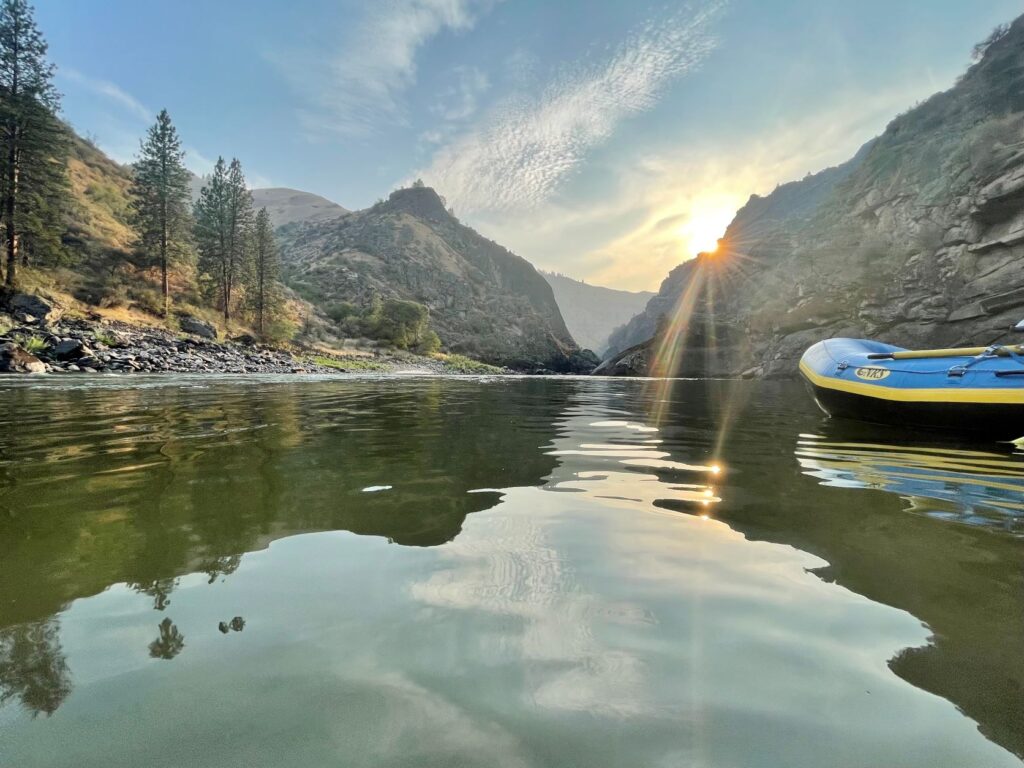
Most recently, NRS has partnered in a communications plan advocating for the removal of the lower four Snake River dams to help restore wild salmon and steelhead populations while promoting an economic revival in the Inland Northwest.
NRS also proudly supports Idaho Rivers United, focused on keeping drinking water clean, defending at-risk populations of fish, and minimizing the impacts of dams on Idaho’s rivers. (JJ)
Spokane Riverkeeper
What They Do: Spokane Riverkeeper is a vigilant guardian and advocate for the Spokane River and its watershed. The Spokane Riverkeeper works to protect the river’s ecological health, its aesthetic integrity, and the public uses of the river for future generations of our community. The end goal? A healthy, fishable and swimmable Spokane River. Spokaneriverkeeper.org
Local Supporter: FLOW Adventures
The Cause: The Spokane River is a beloved natural asset for the entire community, and the Spokane Riverkeeper’s first priority is to defend the river against pollution and to hold polluters accountable. Formed in 2009 to stop polluters from abusing the river, the group takes a hands-on approach that includes an active presence on the river and uncompromising advocacy.
In addition to regularly cleaning up thousands of pounds of trash from the river with help from volunteers, Spokane Riverkeeper has stopped millions of gallons of raw sewage from entering the river each year and created a pioneering effort to keep toxic pollution out of the river. Anyone who spends time on the river owes them a big thank you.
It’s no wonder that FLOW Adventures is a major supporter of Spokane Riverkeeper. The “FLOW” in the Spokane-based river outfitter’s name stand for “For Love Of Water.” FLOW takes clients on whitewater rafting trips on the Spokane and Salmon rivers, rents tubes and other inflatable craft, and runs tubing shuttles, and a clean river is essential to owners Jon and Jeanie Wilmot’s business.
“FLOW got started with Riverkeeper near the beginning,” says founder/owner Jon Wilmot. “It was a good fit, and the river is such a wonderful resource, and it needs all the help it can get.” FLOW helps out Spokane Riverkeeper in several ways, explains Wilmot, including having staff assist with cleanup projects on the river, using their rafts to haul out trash, donating auction items for fundraisers, and, more recently, donating a new raft to Spokane Riverkeeper to use for cleanups and other work to protect the river.
“I’ve been floating the river for a long time, and it’s been a wonderful place to play,” he says. “I want it to be a wonderful place to play forever and will do what I can to help keep it that way.”

Wilmot also emphasizes that Spokane Riverkeeper does a lot more than the important work of almost weekly volunteer-driven river cleanups, a sentiment that Riverkeeper program director Jule Schultz echoes. The organization spends the bulk of its efforts using science, education, advocacy, and the law to protect and clean up the Spokane River, he explains. And the organization’s citizen science program is a prime example.
Earlier this year Spokane Riverkeeper had volunteers out daily measuring sediment coming out of Hangman Creek during the rainy season when the creek regularly dumps tons of dirt into the Spokane River, says Schultz. This cloudy water is bad for fish, macroinvertebrates, and other wildlife that depend on them.
“We are taking that scientific data we collect with volunteer help and are using it for both advocacy and policy making to protect the river,” explains Schultz. Interest in all of Riverkeeper’s volunteer projects has been tremendous in recent years too, adds Schultz. “We are seeing more and more interest in the Spokane River and protecting it than ever before.” (DK)
Save Our Wild Salmon
What They Do: Save Our Wild Salmon (SOS) is a coalition of conservation organizations, recreational and commercial fishing associations, clean energy and orca advocates, and businesses and citizens committed to protecting and restoring abundant, self-sustaining fishable populations of salmon and steelhead to the Columbia-Snake River Basin. Wildsalmon.org
Local Supporter: Eco Depot
The Cause: The Columbia-Snake River Basin was once the most prolific salmon producing regions on the planet with returns of adult wild salmon and steelhead exceeding 16 million fish annually. In recent years those populations have plummeted, and SOS and many scientists lay the blame mainly on the many large dams built on the Columbia and Snake Rivers over the last century. Consequently, all four of the remaining salmon and steelhead populations in the Snake River Basin are at risk of extinction.
SOS works to restore salmon and steelhead in the Snake River Basin in two main ways: 1. Securing removal of the lower Snake River’s four high cost and low value dams and restoration of a free-flowing river as a cornerstone of a lawful Columbia Basin Salmon Plan along with other measures. And 2., securing a modernized U.S.—Canada Columbia River Treaty that expands its purpose to include ecosystem-based function or health of the river as co-equal with the treaty’s other purposes of energy production and flood management, as well as ensuring that Columbia Basin Tribes and First Nations are treated as full partners.
Bruce Gage, co-owner of Eco-Depot, a Spokane-based commercial and residential solar installer that’s been helping people create energy from the sun since 1999, was first introduced to the plight of Northwest salmon by Save Our Wild Salmon. Gage admits he didn’t know much about the campaign to remove the four Lower Snake River dams when he first met SOS’s Inland Northwest director Sam Mace, who is now his partner.
“I was into solar and Sam was into salmon, and that’s kind of how I got interested in the whole idea of using solar to save salmon,” explains Gage.
Eco-Depot has been a financial sponsor of SOS and provided event support for all five years of the Free the Snake River Flotilla events (now known as the Nimiipuu River Rendezvous), where hundreds of salmon advocates gathered on the Snake River in boats to rally for dam removal. Gage says Eco Depot has also signed onto letters from business owners supporting dam removal, including hand delivering one such letter to Senator Murray’s office in Washington, D.C.
And then there’s the salmon and solar connection, adds Gage. “By installing more solar all around the Inland Northwest, we are helping to counter any argument that those four damns need to be kept for energy production, even though they produce so little power in the first place.” (DK)
